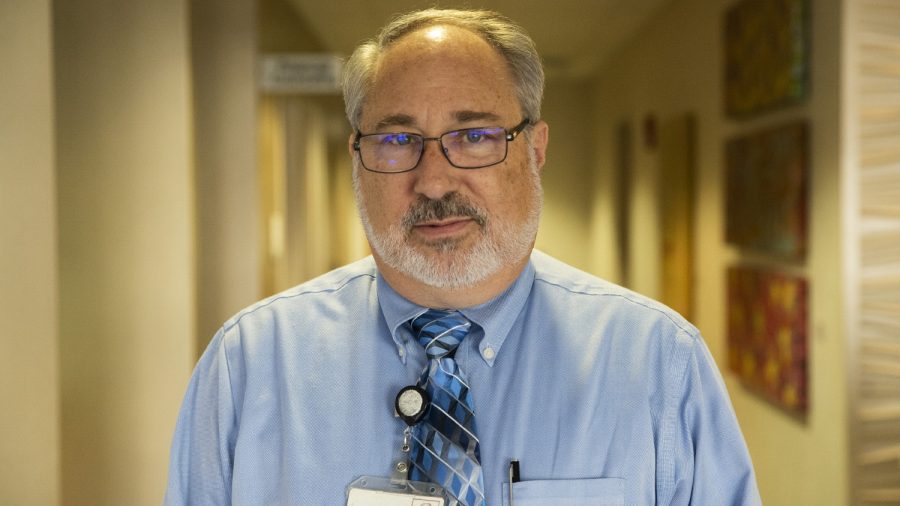University of Iowa receives grant to improve statewide maternal health
University of Iowa Health Care partnered with the Iowa Department of Public Health to receive a $10 million grant aimed towards improving maternal health outcomes in the state.
UIHC maternity researcher Stephen Hunter poses for a portrait on Monday Oct. 7, 2019. Maternal medicine experts with UIHC, in partnership with the Iowa Department of Public Health have received a $10 million dollar grant to improve maternal health outcomes in the state.
October 9, 2019
In a rural state such as Iowa, many residents face challenges when accessing maternal-health care because hospital locations may be spread out. A grant from the Health Resources & Services Administration will help the University of Iowa solve this problem.
UI Health Care received a $10 million grant to conduct research in partnership with the Iowa Department of Public Health in an effort to improve maternal-health outcomes in Iowa.
The five-year grant will allow researchers at UI Hospitals and Clinics to explore making maternal-health care in rural areas more accessible to Iowans.
The researchers will develop a system to easily collect and analyze data continuously, said Stephen Hunter, principal investigator for the research. The team will also develop and implement programs to overcome the problems Iowa faces when it comes to access to maternal-health care, he said.
RELATED: UI partners with Congolese community for pregnancy health research
The U.S. has a high maternal-mortality rate compared with other developed countries, Hunter said. Although the U.S. maternal-mortality rate is decreasing, the rate in Iowa is rising, he said.
According to America’s Health Rankings, maternal mortality in Iowa increased 16 percent since 2016, leading to a total 17.9 deaths per 100,000 live births.
“Iowa has not escaped that. Our mortality rate doubled in the last three years,” Hunter said. “So, this is becoming a very important, national issue. And Iowa — like I said — is not escaping that trend.”
The American College of Obstetricians and Gynecologists predicted a shortage of 9,000 OB-GYNs in the nation by 2030, he said.
Rural hospitals in Iowa have seen shortages in obstetric doctors and nurses as well because of a drop in the number of people who choose to practice in the area, Hunter said. The hospitals also cannot afford to keep facilities open, he added.
Through the grant, researchers have discussed developing a rural OB-GYN residency program, a fellowship for family-medicine physicians, and starting a nurse- and midwife-training program, Hunter said.
RELATED: University of Iowa Hospitals and Clinics see increase in placenta problem
There is also discussion of working to use telemedicine in a way that will give patients access to specialty care without needing to travel, he said.
The Iowa Department of Public Health submitted the grant application and the money will go toward the department, but the UI is subcontracted to do the work and services, said Stephanie Trusty, a nurse clinician in the department.
“We want to eliminate preventable maternal death and we want equal access to quality OB care, regardless of where women live,” Trusty said.
According to the American College of Obstetricians and Gynecologists, the number of OB-GYN professionals per women of reproductive age is among the lowest in the country, she said.
Numbers from the Iowa Medical Society show the state of Iowa ranks last for the number of OB-GYNs per 10,000 women.
Iowa typically performed better in metrics related to maternal- and child-health outcomes in the past decades, said Kimberly Leslie, UI Obstetrics and Gynecology department chair.
RELATED: New postpartum depression medication approved by the FDA
Any advantages the state held in these areas declined because of critical-access hospitals that closed, she said.
Hospitals receive less reimbursement from Medicaid and commercial insurance for maternal-health care, Leslie said, making it so hospitals cannot take care of patients without losing money.
“Only nine states were chosen to be a part of this program,” Leslie said. “And it was deemed that Iowa had significant need based upon what we presented, so I think it’s great we got the grant, but it also tells us that the state of Iowa is in significant need.”






